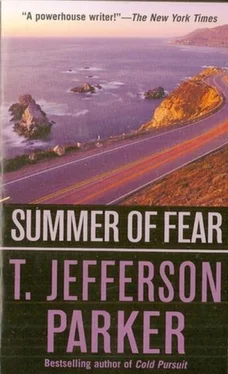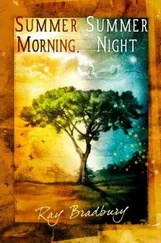T. Parker - Summer Of Fear
Здесь есть возможность читать онлайн «T. Parker - Summer Of Fear» весь текст электронной книги совершенно бесплатно (целиком полную версию без сокращений). В некоторых случаях можно слушать аудио, скачать через торрент в формате fb2 и присутствует краткое содержание. Жанр: Криминальный детектив, на английском языке. Описание произведения, (предисловие) а так же отзывы посетителей доступны на портале библиотеки ЛибКат.
- Название:Summer Of Fear
- Автор:
- Жанр:
- Год:неизвестен
- ISBN:нет данных
- Рейтинг книги:3 / 5. Голосов: 1
-
Избранное:Добавить в избранное
- Отзывы:
-
Ваша оценка:
- 60
- 1
- 2
- 3
- 4
- 5
Summer Of Fear: краткое содержание, описание и аннотация
Предлагаем к чтению аннотацию, описание, краткое содержание или предисловие (зависит от того, что написал сам автор книги «Summer Of Fear»). Если вы не нашли необходимую информацию о книге — напишите в комментариях, мы постараемся отыскать её.
Summer Of Fear — читать онлайн бесплатно полную книгу (весь текст) целиком
Ниже представлен текст книги, разбитый по страницам. Система сохранения места последней прочитанной страницы, позволяет с удобством читать онлайн бесплатно книгу «Summer Of Fear», без необходимости каждый раз заново искать на чём Вы остановились. Поставьте закладку, и сможете в любой момент перейти на страницу, на которой закончили чтение.
Интервал:
Закладка:
"He was not a happy child," she answered, looking down at the page. "I can't believe how much you have on him. On… us."
"Mrs. Ing," said Erik, with a look of deep gravity, "you have absolutely nothing to be ashamed of. You have come here, and you are saving lives. You are a good person."
Karen shifted uneasily in her seat, as did Martin Parish. If Winters detected the massive condescension, he did not let on. Neither did Mary. She blushed deeply, looked down at the pages, and wiped her eye again with the wadded blue tissue.
Parish went back to reading.
Ing was a large child, plump and not athletic, shy and friendless. More aggressive boys hit him, girls derided or ignored him; teachers disliked him because he was slow and stubborn as a student. His epilepsy was a topic for chiding. Ing came in at 136 on the Stanford-Binet IQ test. He was often truant, for which he was beaten by his father. Howard, according to Billy, was "always drunk" and abusive, sometimes to the point of hitting Mary with his fists. Howard had told his son many times that Billy and Mary were "anchors" around his neck, that the long hours he worked to support them were hours he would have spent-without the curse of their presence-in a life devoted to, of all things, the study of law.
I looked at Mary, who continued staring down at the papers on her lap. She gave off a clear, if inaudible, wail of distress. Sensing my attention on her, she glanced quickly at me, held my gaze for a moment with her hopeless blue eye: then directed them back toward her lap. Her fist clenched hard upon the tissue.
Parish flipped a page and continued.
According to Billy, Howard was a man "so stupid and fat” that he got along better with animals than people.
"I expected this," said Wald. "It fits perfectly."
"Then maybe you should let me read it," said Parish.
"Pardon me, Captain," said Erik.
Parish grunted and went on. According to Billy, the Ing always had three Staffordshire terriers (pit bulls) and three cat: One of Billy's jobs was to feed and clean up after them before his father came home from work. He hated the animals, the way they "slobbered and shit everywhere," the way they seemed, for reasons beyond his understanding, to receive more love and tender attention from his father than he did. He was attacked at age eight by all three of the dogs one night, receiving 135 stitches to close the wounds. As an adult, he grew facial hair to cover the scars.
Karen interrupted. "Sheriff, what's your call on the scars? We can publish it, or we can hold it."
"Why publish?" asked Wald, "He's wearing a beard."
"It can't hurt," said Parish. "What if he shaves? Which is a distinct possibility, after the picture we ran."
Winters contemplated this. "Drop the scars, Russ. Let' hope he keeps the beard. Mrs. Ing, any pictures of Billy with no beard and the scars visible?"
She shook her head. "He's worn a beard and mustache since he was in his early twenties. The scars embarrass him. I don't think he would shave."
Winters nodded. "Save the scars, Monroe. You got only ^ so much space."
Parish shook his big head as if he were dealing with children, then continued.
According to Billy, the dog attack, although terrifying and deeply angering, was not nearly as painful to him as the incident that immediately preceded it.
At this point, Parish looked at Mary Ing and asked with a gentleness that surprised me, "Is it okay to read this, Mrs. Ing?"
She nodded but didn't look up.
Apparently, during one of his rages, Howard began beating Mary. Billy could hear them behind the closed door of the bedroom. His father was "grunting," something-or someone- was slamming against a wall, and his mother was sobbing. Billy threw open the door. Howard's back was to him, and he had his coat on, but his pants were down around his ankles. All Billy saw of his mother, blocked as she was by his father, were her two hands, fingers spread against the wall, and the profile of her face-"strangely angled"-also pressed to the wall, "like she was trying to hear something on the other side of it." Billy said that it looked "painful" for his mother. So he jumped onto his father's back. Howard easily shook him off, and when Billy rushed to his mother's aid, she slapped him so hard across his face that he stopped dead in his tracks. Billy said later that the feeling of Mary's hand on his flesh was "the single worst pain I ever felt." Billy had then run out the back door of his bedroom, across the darkened backyard toward the fence, behind which lay the flood-control channel, and made two unsuccessful leaps to get atop that fence before Howard's pit bulls-in a snarling fury of mistaken protection-dragged him down.
"Note the date," said Wald. "Fourth of July, 1962. The County shrink notes that the dogs might have been aroused by the neighborhood fireworks, which in '62 were legal and popular. Look, even Billy says, down at the bottom of the page, that he remembered hearing the scream of a 'Picolo Pete' going off as he tried to get over the fence. This is the answer to the question of why he took the vet hospital job. Not the answer actually-but the question itself. Fear and its governance. E you integrate it or isolate it?"
"Who cares?" asked Martin.
"If we understand him, we can help him," said Wald.
"I thought we were supposed to stop him," said Parish.
Wald, obviously trying to accommodate Mary's feelings-and to pave in advance a layer of trust, should we need her help-smiled at Parish and shook his head. "We help Billy, we help everybody in this county, Martin. That's what we're paid to do."
Karen looked at me. "This isn't the kind of stuff we expect to see in your next piece, Russ. It's background."
As Parish proceeded with his reading, I couldn't help but feel some pity for the Billy Ing who used to be. And I also couldn’t help but wonder whether anyone-especially a county ps ^y chologist-could ever really locate the reason why a human turns into a hunter of other humans, a thrill killer, a living nightmare. True, Ing's story was horrible enough-a violent family bad experiences at school, even the awful attack by his own dogs. But there were thousand of others with comparable-or worse-lives who had managed somehow not to break, not turn, not to slip over that final edge and fall into the numb, self-pitying, remorseless rage that is the hallmark of the sociopath murderer. Why Ing, if indeed Ing was the Midnight Eye? Why not someone who had suffered even more?
I have a theory, though perhaps it's less a theory than simple point of view. I'm not a religious man, though faith has something to do with my theory, as does the cold truth of mathematical probability. (The idea has come to me that God and mathematics are one.) But I've always believed that there is God somewhere, that certain people are closer to that God than others, that some are tied to a "purpose" that seems to come from outside of themselves, from "above." My list would include people as diverse as Solomon, Buddha, Gerard Manley Hopkins, Muhammad, Blake, and certainly Jesus Christ. Thus, statistically, one in every Xmillion people are "chosen" or "choose" or simply end up being closer to God than the rest of us, and they function much as journalists, scurrying between above and below, reporting back, keeping us informed. It is their job to carry out the high-level diplomacy that people like me would only bungle- misquoting, missing deadlines, missing the point, losing the notes, erasing the tapes. Similarly, there are those "chosen" to do the darkest work of the world, to function as God's continuing curse upon us, or-for those amused by the concept of God-to fulfill the mathematical fact that for every X million men and women who walk the earth at a given time, one of them will be little more than a merciless predator of other men and women. Solomon was chosen for his gift of poetry; the Midnight Eye for his gift of rage. One celebrates his specific blessing; the other bears his unique curse. But both do their work so that we don't have to. The Eye was a serial killer for the simple purpose of allowing me to be a writer. In a sense, I owed him. I extend this sense of gratitude to all sufferers of disease, too. Especially to Isabella, who, I am convinced, received her sickness so that I would not. None of this is to say that the best place for the Midnight Eye is not the guillotine or some modern equivalent-it probably is. And if called upon to lower the blade, I certainly would, though less with a feeling of vengeance than a sense of duty. I would lower the blade so you wouldn't have to. Cancer is a serial killer; a serial killer is a cancer. No one chooses either. Parish then briefly reviewed Ing's history of epilepsy, while I wondered whether his taped stutterings might have been influenced by seizures, or post seizure confusion. Had he taped them during the "aura" experienced by some epileptics before a fit, those seconds of ecstasy, vision? Ing had admitted to being heavy drinker from the age of eighteen, when he left his parent: home and took the job as hospital night clerk. After his four year stint there, Ing began a life of localized vagrancy that took him further and further out of contact with his mother, and oddly, further away from contact with law enforcement.
Читать дальшеИнтервал:
Закладка:
Похожие книги на «Summer Of Fear»
Представляем Вашему вниманию похожие книги на «Summer Of Fear» списком для выбора. Мы отобрали схожую по названию и смыслу литературу в надежде предоставить читателям больше вариантов отыскать новые, интересные, ещё непрочитанные произведения.
Обсуждение, отзывы о книге «Summer Of Fear» и просто собственные мнения читателей. Оставьте ваши комментарии, напишите, что Вы думаете о произведении, его смысле или главных героях. Укажите что конкретно понравилось, а что нет, и почему Вы так считаете.












